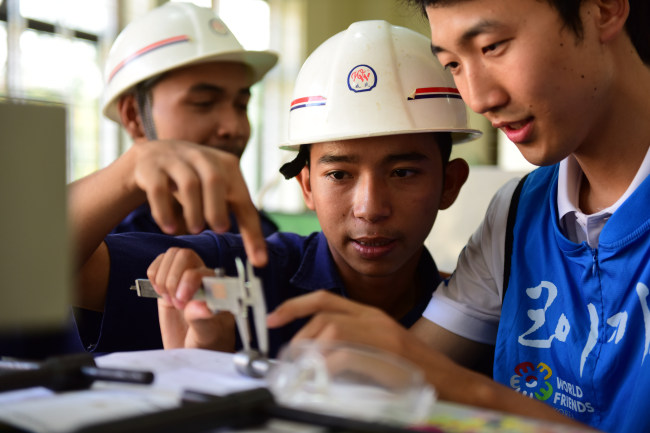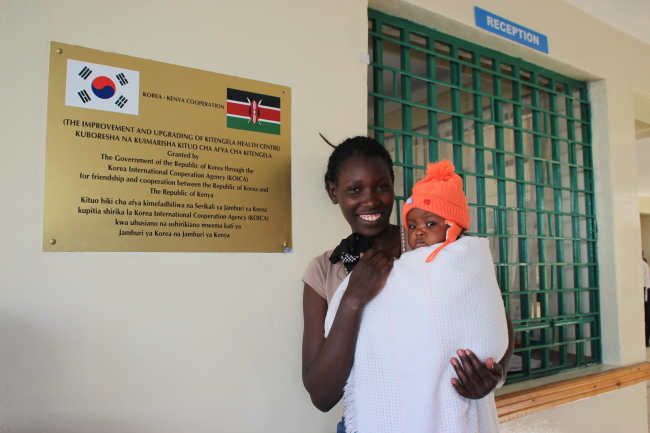Challenges, opportunities for Korea’s ODA in 2017
Election, global political uncertainties remain key factors
By Shin Hyon-heePublished : Dec. 25, 2016 - 17:33
Next year’s presidential election in Korea, growing global political and economic uncertainties and fresh waves of nationalism in the West are set to come together to pose both challenges and opportunities to Seoul’s efforts to help fight poverty in the developing world.
Since it first started its official development assistance in 1987, Korea has been striving to shore up its commitment by focusing on sharing technology and other know-how from its own rapid development.
Nearly 30 years on, officials, scholars and activists are fiercely discussing how to redefine Korea’s ODA model. The topic is expected to come to the fore ahead of next year’s presidential election and beyond, as is the issue of whether and how to integrate loans and grants.
Adding to the debate are external factors such as a resurgence of nationalism that culminated in Britain’s departure from the European Union and the election of Donald Trump as the next US president.
“It will be imperative to watch how the Trump administration, Brexit, and the global nationalist movement alike shape up the discourse and policy on ODA at home and abroad,” Kim In, vice president of the Korea International Cooperation Agency, told The Korea Herald.
“Internally, debate will continue to heat up over how to establish a ‘Korean-style ODA.’’’
Since it first started its official development assistance in 1987, Korea has been striving to shore up its commitment by focusing on sharing technology and other know-how from its own rapid development.
Nearly 30 years on, officials, scholars and activists are fiercely discussing how to redefine Korea’s ODA model. The topic is expected to come to the fore ahead of next year’s presidential election and beyond, as is the issue of whether and how to integrate loans and grants.
Adding to the debate are external factors such as a resurgence of nationalism that culminated in Britain’s departure from the European Union and the election of Donald Trump as the next US president.
“It will be imperative to watch how the Trump administration, Brexit, and the global nationalist movement alike shape up the discourse and policy on ODA at home and abroad,” Kim In, vice president of the Korea International Cooperation Agency, told The Korea Herald.
“Internally, debate will continue to heat up over how to establish a ‘Korean-style ODA.’’’

Last year, the collective ODA from 28 donor countries rose 6.9 percent from the year before to reach $131.6 billion, thanks chiefly to increased refugee support, according to data from the Organization for Economic Cooperation and Development’s Development Assistance Committee. Yet only six member states met the UN target of 0.7 percent of gross national income, with Korea not among them. Another six lowering ODA expenditure.
In the wake of Brexit, there are concerns that more European nations might cut the financing of programs that have saved millions of lives across the globe. Trump’s vision for overseas aid remains largely unknown. But his team has singled out nuclear proliferation and the fight against terrorist groups like the Islamic State group as its top foreign policy priorities, which may mean a loss of interest in Washington’s aid disbursements.
If the isolationist trend accelerates in the coming years -- with donor states turning more inward and injecting more resources into propping up their domestic economy -- it could affect Seoul’s ODA spending, undercutting calls for a further increase, experts said.
Mindful of the concerns, Oh Joon, Seoul’s former ambassador to the UN, stressed the significance of the Sustainable Development Goals, which were adopted at the UN in late 2015 as the next development agenda for 2020. By achieving the SDGs, the international community could also curb the dark side of globalization such as inequality and the cultural, social and racial divide, he said.
“How to maximize the benefits of globalization and minimize its side effects is now the task of the times,” he said at a seminar on development aid in Seoul early this month.
“The SDGs may serve as a compass that will guide globalization in a positive direction, putting the furthest behind first and leaving no one behind. Korea, too, should work to put the SDGs in the mainstream of its development cooperation diplomacy.”
Korea plans to spend about 2.7 trillion won ($2.3 billion) on nearly 1,300 ODA programs next year, representing a 12 percent on-year growth. Bilateral grants and loans account for around half and 34 percent of total expenditure, respectively, with the remainder allotted to fund multilateral partnerships.
Most of the projects are designed to help recipient countries tackle industrialization, poverty, education and health in line with the SDGs.

Seoul’s ODA faces other longstanding tasks, such as the limited funding scale, a lopsided reliance on loans relative to grants and fragmented policies among responsible state agencies.
Though the share of loans in the entire budget has steadily risen, consensus among the 28 countries of the Development Assistance Committee has long built toward a 100 percent grant principle. Korea’s GNI ratio stands at a mere 0.14 percent -- far lower than not only the UN target, but also the 0.3 percent rich-world average.
Conflicting interests and tension between the foreign and finance ministries -- in charge of grants and loans -- have been blamed for eroding the aid’s overall effectiveness. With the Prime Minister’s Office having failed to play a coordinator role, the UN, OECD and other international and local relief groups have expressed concerns about the fragmentation.
The ongoing discussion on “Korean-style ODA” was essentially born out of the concerns, as Seoul’s current scheme was modeled on that of Japan, which also faced similar setbacks.
As part of the efforts, talk is resurfacing of incorporating grants and loans in the next administration, industry insiders say. Views vary, however, as to whether the government should launch a new, independent aid agency such as the US Agency for International Development, or if a ministry should take over other agencies’ functions to become a control tower.
But Lee Tae-joo, a cultural anthropology professor at Hansung University in Seoul, emphasized that instead of modeling, the central point of debate should remain how to boost aid’s sustainability such as by promoting public-private partnerships and the ownership of the recipient countries.
“Since Korea joined the DAC in 2010, political demands have been soaring for the establishment of a ‘Korean-style’ assistance,” he said during the seminar. “But even Japan has not modeled its methods because, according to Japanese specialists, each developing country needs a different model based on its characteristics and contexts.”
“To promote genuine cooperation with developing countries, we need to gather knowledge about their history and geology and foster serious conversations, whether it be grants or loans,”
By Shin Hyon-hee (heeshin@heraldcorp.com)








![[KH Explains] Hyundai's full hybrid edge to pay off amid slow transition to pure EVs](http://res.heraldm.com/phpwas/restmb_idxmake.php?idx=644&simg=/content/image/2024/04/18/20240418050645_0.jpg&u=20240419100350)






![[From the Scene] Monks, Buddhists hail return of remains of Buddhas](http://res.heraldm.com/phpwas/restmb_idxmake.php?idx=652&simg=/content/image/2024/04/19/20240419050617_0.jpg&u=20240419175937)

![[KH Explains] Hyundai's full hybrid edge to pay off amid slow transition to pure EVs](http://res.heraldm.com/phpwas/restmb_idxmake.php?idx=652&simg=/content/image/2024/04/18/20240418050645_0.jpg&u=20240419100350)

![[Today’s K-pop] Illit drops debut single remix](http://res.heraldm.com/phpwas/restmb_idxmake.php?idx=642&simg=/content/image/2024/04/19/20240419050612_0.jpg&u=)